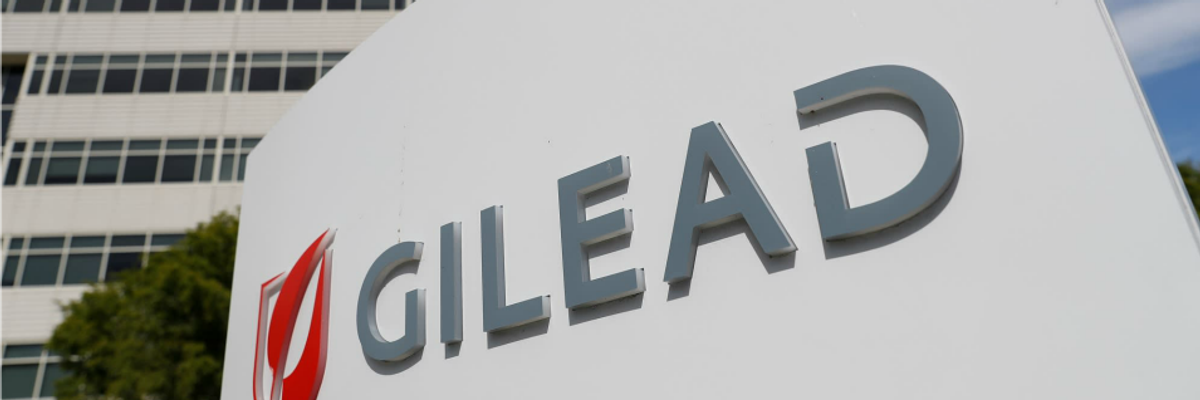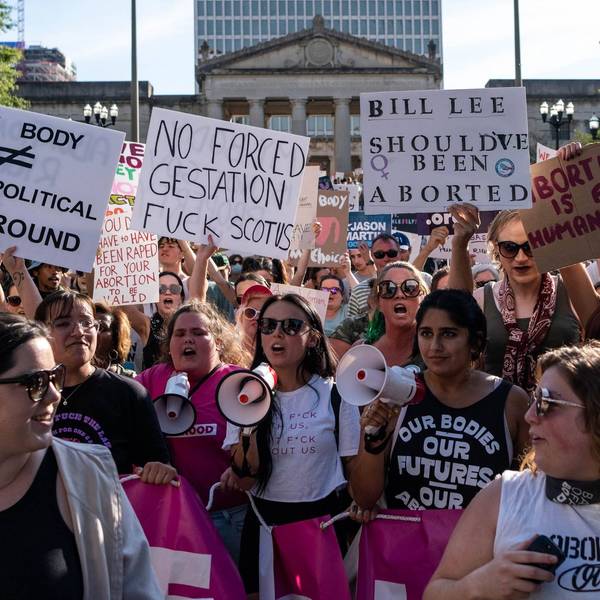
"In the United States, Truvada is monopolized by the pharmaceutical giant Gilead, which charges between $1,600 and $2,000 a month for the treatment," Cooper writes. (Photo: Reuters)
Why Is the Government Allowing Its Own Drug Research to Be Monopolized for Profit?
The government is doing nothing to prevent outrageous price-gouging, which places a near-insurmountable barrier to getting a life-saving drug out to all who need it
How do we eradicate HIV/AIDS? One route is a vaccine, but so far that has proved a very difficult research problem. There is an ongoing clinical trial of one promising treatment in South Africa, but unlike the smallpox or polio vaccines, it appears to provide only moderate protection. Another is "pre-exposure prophylaxis," or PrEP -- drugs which prevent HIV infection if taken every day. One such treatment called emtricitabine/tenofovir (better known by its brand name Truvada) works very well for this, cutting the risk of infection by up to 93 percent.
"It's an object lesson in the dangers of allowing private companies to profiteer off government research."
But there is a problem. As The Washington Post reports, in the United States, Truvada is monopolized by the pharmaceutical giant Gilead, which charges between $1,600 and $2,000 a month for the treatment (the wholesale price is $1,414). Bizarrely, the studies proving Truvada works for PrEP were conducted and paid for almost entirely by the federal government (the Gates Foundation also helped). The Centers for Disease Control even holds a patent on this specific treatment.
Yet the government is doing nothing to prevent this outrageous price-gouging, which places a near-insurmountable barrier to getting the drug out to all who need it. It's an object lesson in the dangers of allowing private companies to profiteer off government research.
First, some background. Truvada was originally developed to treat people who already had HIV, as part of the usual suite of anti-retroviral medications to slow down the virus' progress. Two government-funded scientists proved it could be used to prevent transmission -- first Thomas Franks at the CDC, who demonstrated it worked with monkeys, then Robert Grant, who showed the same for humans with a grant from the National Institutes of Health. That work was completed around 2004.
Gilead immediately set about marketing and selling Truvada for PrEP, which brought in $3 billion last year and $36.2 billion since 2004. Yet because of the eye-watering price (and broader dysfunction in the American health-care system), only about 20 percent of the people who need the drug are getting it, and many who do have to navigate hellish bureaucracy to get access. The extreme cost also sucks money away from other priorities, particularly for cash-strapped state Medicaid programs.
Read the full article at The Week.
An Urgent Message From Our Co-Founder
Dear Common Dreams reader, The U.S. is on a fast track to authoritarianism like nothing I've ever seen. Meanwhile, corporate news outlets are utterly capitulating to Trump, twisting their coverage to avoid drawing his ire while lining up to stuff cash in his pockets. That's why I believe that Common Dreams is doing the best and most consequential reporting that we've ever done. Our small but mighty team is a progressive reporting powerhouse, covering the news every day that the corporate media never will. Our mission has always been simple: To inform. To inspire. And to ignite change for the common good. Now here's the key piece that I want all our readers to understand: None of this would be possible without your financial support. That's not just some fundraising cliche. It's the absolute and literal truth. We don't accept corporate advertising and never will. We don't have a paywall because we don't think people should be blocked from critical news based on their ability to pay. Everything we do is funded by the donations of readers like you. Will you donate now to help power the nonprofit, independent reporting of Common Dreams? Thank you for being a vital member of our community. Together, we can keep independent journalism alive when it’s needed most. - Craig Brown, Co-founder |
How do we eradicate HIV/AIDS? One route is a vaccine, but so far that has proved a very difficult research problem. There is an ongoing clinical trial of one promising treatment in South Africa, but unlike the smallpox or polio vaccines, it appears to provide only moderate protection. Another is "pre-exposure prophylaxis," or PrEP -- drugs which prevent HIV infection if taken every day. One such treatment called emtricitabine/tenofovir (better known by its brand name Truvada) works very well for this, cutting the risk of infection by up to 93 percent.
"It's an object lesson in the dangers of allowing private companies to profiteer off government research."
But there is a problem. As The Washington Post reports, in the United States, Truvada is monopolized by the pharmaceutical giant Gilead, which charges between $1,600 and $2,000 a month for the treatment (the wholesale price is $1,414). Bizarrely, the studies proving Truvada works for PrEP were conducted and paid for almost entirely by the federal government (the Gates Foundation also helped). The Centers for Disease Control even holds a patent on this specific treatment.
Yet the government is doing nothing to prevent this outrageous price-gouging, which places a near-insurmountable barrier to getting the drug out to all who need it. It's an object lesson in the dangers of allowing private companies to profiteer off government research.
First, some background. Truvada was originally developed to treat people who already had HIV, as part of the usual suite of anti-retroviral medications to slow down the virus' progress. Two government-funded scientists proved it could be used to prevent transmission -- first Thomas Franks at the CDC, who demonstrated it worked with monkeys, then Robert Grant, who showed the same for humans with a grant from the National Institutes of Health. That work was completed around 2004.
Gilead immediately set about marketing and selling Truvada for PrEP, which brought in $3 billion last year and $36.2 billion since 2004. Yet because of the eye-watering price (and broader dysfunction in the American health-care system), only about 20 percent of the people who need the drug are getting it, and many who do have to navigate hellish bureaucracy to get access. The extreme cost also sucks money away from other priorities, particularly for cash-strapped state Medicaid programs.
Read the full article at The Week.
How do we eradicate HIV/AIDS? One route is a vaccine, but so far that has proved a very difficult research problem. There is an ongoing clinical trial of one promising treatment in South Africa, but unlike the smallpox or polio vaccines, it appears to provide only moderate protection. Another is "pre-exposure prophylaxis," or PrEP -- drugs which prevent HIV infection if taken every day. One such treatment called emtricitabine/tenofovir (better known by its brand name Truvada) works very well for this, cutting the risk of infection by up to 93 percent.
"It's an object lesson in the dangers of allowing private companies to profiteer off government research."
But there is a problem. As The Washington Post reports, in the United States, Truvada is monopolized by the pharmaceutical giant Gilead, which charges between $1,600 and $2,000 a month for the treatment (the wholesale price is $1,414). Bizarrely, the studies proving Truvada works for PrEP were conducted and paid for almost entirely by the federal government (the Gates Foundation also helped). The Centers for Disease Control even holds a patent on this specific treatment.
Yet the government is doing nothing to prevent this outrageous price-gouging, which places a near-insurmountable barrier to getting the drug out to all who need it. It's an object lesson in the dangers of allowing private companies to profiteer off government research.
First, some background. Truvada was originally developed to treat people who already had HIV, as part of the usual suite of anti-retroviral medications to slow down the virus' progress. Two government-funded scientists proved it could be used to prevent transmission -- first Thomas Franks at the CDC, who demonstrated it worked with monkeys, then Robert Grant, who showed the same for humans with a grant from the National Institutes of Health. That work was completed around 2004.
Gilead immediately set about marketing and selling Truvada for PrEP, which brought in $3 billion last year and $36.2 billion since 2004. Yet because of the eye-watering price (and broader dysfunction in the American health-care system), only about 20 percent of the people who need the drug are getting it, and many who do have to navigate hellish bureaucracy to get access. The extreme cost also sucks money away from other priorities, particularly for cash-strapped state Medicaid programs.
Read the full article at The Week.

